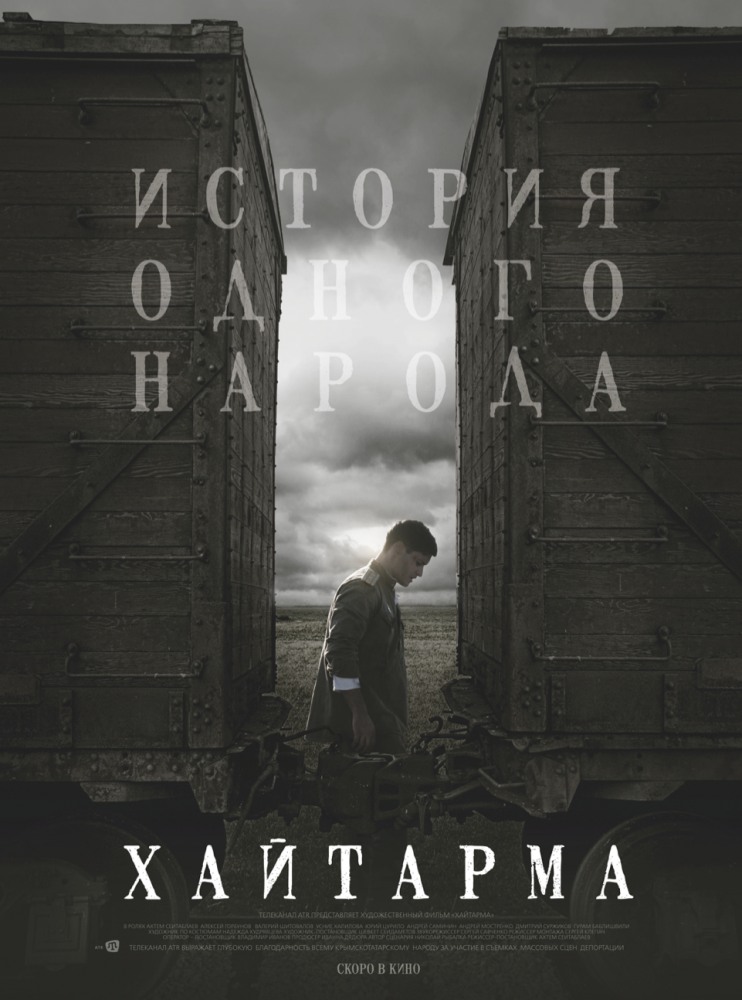
International Committee for Crimea, Inc
The Release of Haytarma and its Aftermath
By Greta L. Uehling, Ph.D.*
Reporting from Simferopol
May 2013 marks the release of the first feature length film about the deportation of the Crimean Tatars, Haytarma. For the Crimean Tatars and their supporters, the film begins to fill a void left by the lack (or classified nature) of photos and historical documents that would help us understand what happened in May, 1944. A trailer for the film can be viewed on YouTube:
Haytarma tells the story of the May 18, 1944, deportation through the life of Amet Khan Sultan, a fighter pilot twice named Hero of the Soviet Union. He was stationed in Crimea at the time of the deportation, and had been granted leave to visit his family in Alupka at the time the deportation started. The film is in Russian and Crimean Tatar with Russian subtitles. Plans are being made for subtitles in additional languages. Akhtem Seitablaev is both the film's producer, and played the lead character. Filming was done by the ATR television production studio based in Simferopol. In the scenes of the mass deportation, over a thousand Crimean Tatars, many of whom had personally experienced the tragic events, played dramatic roles. The film was completed in 2012 on budget of 1.5 million. The film's creators strived for accuracy, consulting with historians and military experts prior to shooting. A Sevastopol history club provided some of the camera technology, enabling the film to convey the flavor of the time. A Kiev-based film review site, FilmSearch, gave the film 8 out of 10 stars.

|
Poster for film Haytarma |
Showings of Haytarma since the May 17 premier at the Shevchenko theatre in Simferopol have been sold out. The film is also playing in other major Crimean cities and Kiev.
The film has aroused deep emotions and been at the center of controversy since its release. Many Crimean Tatars reported being deeply moved by the film, which put parents' and grandparents' stories into visual format. Filmgoers reported the film eliciting tears and described sobbing throughout the entire auditorium. The local newspaper Segodna reported that the film brought Crimean Tatars who hadn't been to a theatre in decades back to the big screen. The film typically receives a standing ovation by audiences in Crimea.
Russian generals who had been trained by Amet Khan Sultan were also invited to the premier. After arriving in Crimea from Moscow, however, six out of eight of the generals decided against attending the premier, after being persuaded by the Consul General for the Russian Federation, Vladimir Andreev, not to go. Journalist sought clarification from Mr. Andreev, who was quoted on Crimean Television ATR as saying "Russia should not be represented at the premier of a film that falsifies the truth of the Great Patriotic war." He also expressed dissatisfaction that the film does not grapple with the theme of "collaboration on the part of Crimean Tatars with the fascist occupiers."
Andreev's statement ignited a series of protests by Crimean Tatars who gathered with local supporters on May 22 and May 23 outside the walls of the Consulate General of the Russian Federation in Simferopol and demanded that Andreev be recalled and declared persona non grata. Ukraine's foreign ministry requested Russian authorities to evaluate the statements. Refat Chubarov, Vice President of the Crimean Tatar Mejlis, Deputy of the Crimean Tatar Kuraltai and President of the World Congress of Crimean Tatars, said in an address before the Supreme Council of the Autonomous Republic of Crimea that while the public statement on the part of the Consul General was "fashionably" xenophobic, the Russian Federation must address the intolerant statement at the highest diplomatic levels.
Following the scandal, the Ministry of Foreign Affairs of the Russian Federation publically recognized the statement as "incorrect." Andreev announced his resignation shortly thereafter. According to the Kiev Telegraph, he clarified that his resignation was prompted by the "helpless and unprincipled statement defaming Russia" made by the Ministry. He also stated that he did not retract his statement. Andreev has since been replaced.
The flurry of emotions surrounding the release of Haytarma is now feeding more sustained discussions of the legacy of the Great Patriotic War and, at a broader level, contemporary inter-ethnic relations in Crimea.
* Dr. Greta L. Uehling, a member of the ICC Board of Directors, teaches at the University of Michigan, Ann Arbor.
See also: "Russian Consul General to Crimea Resigns Following Offensive Comments About Crimean Tatar Deportation," by Idil P. Izmirli, published in: Eurasia Daily Monitor, Volume: 10 Issue: 106, June 5, 2013.
Posted: 8 June 2013
Revised: 12 June 2013